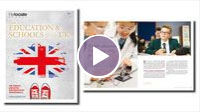Schools performing well in 2017 reveals Ofsted report
The latest annual report from Ofsted reveals a positive outlook for education in the UK. However, persistent areas of underperformance remain within education and care.

- 94 per cent of early years providers are now rated good or outstanding
- 90 per cent of primary schools and 79 per cent of secondary schools are good or outstanding
- 80 per cent of further education and skills providers of are good or outstanding
- 83 per cent of children’s homes are now good and outstanding
- More local authority children’s services are on a path to improvement

Ofsted chief inspector aiming for full potential
Speaking to an audience of education and social care professionals, local authority representatives and policy experts in Westminster, Amanda Spielman said, “Our collective mission – and by that everyone involved in education and care – should be to create a society where every young person, regardless of birth or background, can achieve their full potential.“Everything I see in my job, looking at the work of thousands of children’s homes, colleges, schools and nurseries shows me that isn’t an idle pipe dream.“In fact, the areas of concern identified in today’s report are some of the last remaining barriers that stand in our way. Tackling them will not be easy. But the prize of doing so could be great – a country that is both caring and bold, innovative but unified, aspirational and at the same time fair.“To help policy-makers tackle those barriers, today’s report identifies a small group of schools that have not improved over many years, including around 130 where under-performance has stretched for up to a decade. These schools share some similar characteristics, including unstable leadership, high staff turnover and difficulty recruiting. Many have high proportions of pupils from deprived areas and above average proportions of pupils with special education needs and/or disabilities (SEND).“These schools have all received considerable attention and investment from external agencies, but none of these interventions has worked. Yet schools in similar circumstances are achieving well, showing that improvement is possible.”Education and care spread thin
The report also highlights problems in capacity within the school-led system. The best school leaders and strongest academy trusts are spread too thinly.They cannot provide all the support needed to help other schools improve. The Chief Inspector highlighted the challenge for both policy-makers and the education system to break down ivory towers and ensure that the best schools and leaders are supporting those in need.Amanda Spielman added, “There is no doubt that the leadership challenge facing some schools is great. But progress is possible and we should all be wary of using the makeup of a school community as an excuse for underperformance.“I do find myself frustrated with the culture of ‘disadvantage one-upmanship’ that has emerged in some places. Fixating on all the things holding schools back can distract us all from working on the things that take them forward.“Schools with all ranges of children can and do succeed. Where this is difficult, what is needed is greater support and leadership from within the system. That means making sure the system has the capacity to provide this support.“And this isn’t about just about incremental ‘interventions’ or ‘challenge’. Good schools teach a strong curriculum effectively, and they do it in an orderly and supportive environment: getting this right is the core job of any school. That is what we need to help these problematic schools to deliver.”Related UK education news and features:
- Is single-sex education still relevant today?
- UK universities ‘facing growing global challenge’
- School choice – finding the perfect fit
Areas of weakness for UK education
Ofsted’s commitment to being a force for improvement means focusing attention on those areas that are not yet good enough. Evidence shows that this helps drive up standards of practice in these areas.Other areas of concern identified in the report include:- An increasing number of conservative religious schools deliberately flouting British values and equalities law. Illegal ‘schools’ are also being created in order to avoid teaching fundamental values of democracy, mutual tolerance and respect
- Weaknesses in the statutory framework for the early years foundation stage as a guide for children’s learning in Reception Year. Schools that are best at preparing children for Year 1 are going beyond the framework and setting more challenging expectations, with an emphasis on reading and maths
- The apprenticeship levy is raising a substantial amount of money to fund training. Without adequate scrutiny we will risk repeating the mistakes of the past - attracting cowboy operators that are not committed to high quality learning
- Domestic abuse is the most common factor in the lives of children who need social care services. But more emphasis needs to be placed on tackling perpetrators and understanding what works to stop abusive behaviour
- Secure children’s homes are doing well for children and young people. But young offender institutions and secure training centres are sometimes extremely poor, closing down opportunities for rehabilitation of juvenile offenders
- Some children and young people needing SEND support are having a very poor experience of the education system. And some parents have been pressured to keep their children at home because leaders say they can’t meet their needs. This is unacceptable
Find out more about independent school options in the Winter issue of our magazine which features a boarding school supplement. Coming soon.
Relocate Global's Guide to Education & Schools in the UK 2017 is packed with expert education advice for those who are relocating and the professionals supporting them. Access your digital copy here.For related news and features, visit our Education & Schools section. Look out for the launch of 2018's Relocate Awards, entries open in January. Relocate’s new Global Mobility Toolkit provides free information, practical advice and support for HR, global mobility managers and global teams operating overseas.
 Access hundreds of global services and suppliers in our Online Directory
Access hundreds of global services and suppliers in our Online Directory
©2026 Re:locate magazine, published by Profile Locations, Spray Hill, Hastings Road, Lamberhurst, Kent TN3 8JB. All rights reserved. This publication (or any part thereof) may not be reproduced in any form without the prior written permission of Profile Locations. Profile Locations accepts no liability for the accuracy of the contents or any opinions expressed herein.































